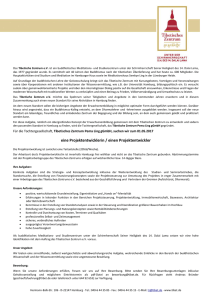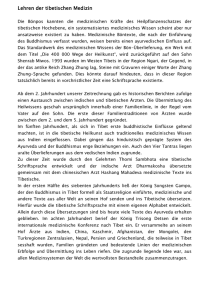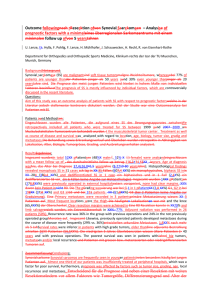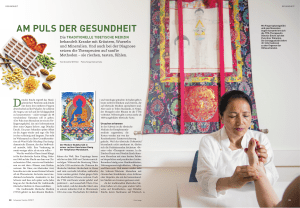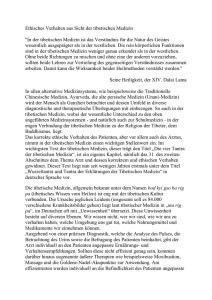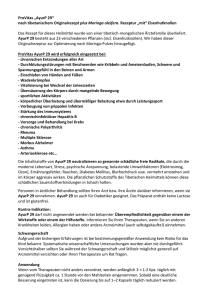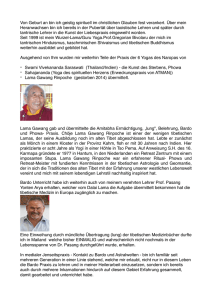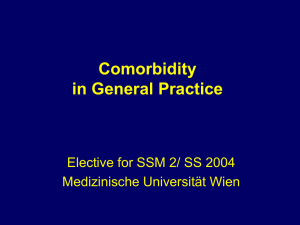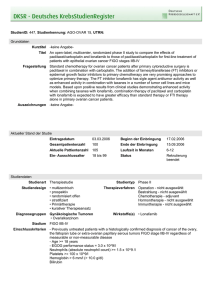Ethik des tibetischen Arztes - Medizinische Universität Wien
Werbung
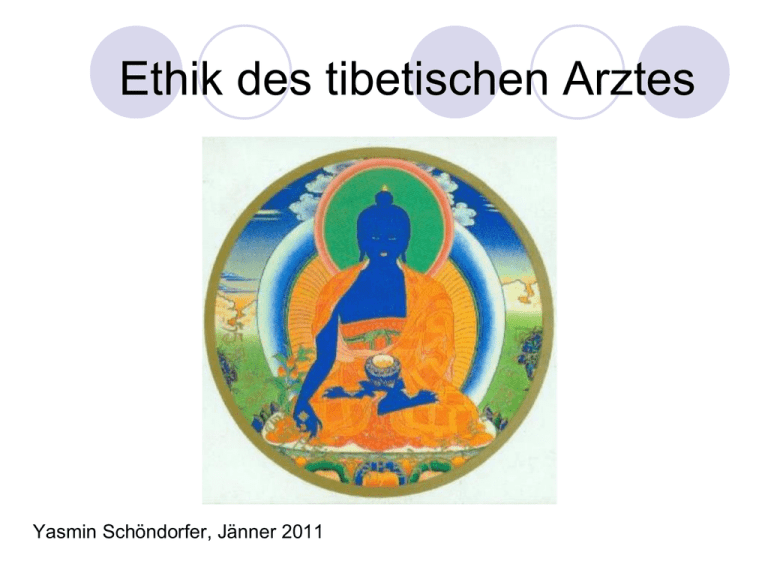
Ethik des tibetischen Arztes Yasmin Schöndorfer, Jänner 2011 Traditionelle Tibetische Medizin TTM Einflüsse: Bön, China, Indien, Persien „Vier Tantras“ (rGyud bzhi) von Yuthok Yonten Gonpo (dem Älteren) 3 elementare Körperprozesse (Nyes pas) rLung Bewegungs- und Transportprozesse mKhris pa Abbauprozesse Bad kan Aufbauprozesse Astrologie Diagnose TTM rGyud bzhi TTM Krankheitsursachen - 3 Geistesgifte Begierde, Neid Hass, Zorn Verblendung Unwissenheit Therapie - 4 Stufen Verhaltensänderungen Diätetische Maßnahmen Arzneien Äußerliche therapeutische Anwendungen Ethik – Definition griechisch: ethos = Sitte, Gewohnheit, Brauch, Charakter „...philosophische Lehre vom guten Handeln.“ (ANTOR & BLEIDICK 2000, 76) Begründbarkeit der Moral Medizinethik: moralische Wertvorstellungen in der Medizin ärztliches Handeln Mögliche Fragestellungen Kann das rGyud bzhi noch als praktische ethische Anleitung eines tibetischen Arztes betrachtet werden? Welche ethischen Grundeinstellung lassen die tibetischen Ärzten im Gespräch erkennen und wie sind diese begründet? Welche Unterschiede finden sich in der moralischen Einstellung eines Buddhisten im Vergleich zu einem tibetischen Arzt? Verhaltenscodex 6 Eigenschaften eines guten Arztes: 1) Intelligenz 2) Liebevolle Zuneigung 3) Den medizinischen Schriften verpflichtet 4) Wie ein geschickter Handwerker 5) Hart arbeitend 6) Weise in weltlichen Dingen 13 Fehler minderwertiger Ärzte Gyamtso, Khenrab; Kölliker, Stephan: Tibetische Medizin. Wissenschaftliche Verlagsgesellschaft mbH, Stuttgart Yuthok Yonten Gonpo You should abandon selfishness, jealousy, negative thoughts and cheating. Inside your heart there should be a compassionate mind. Always work for the benefit to the patients. Do not misuse your medical knowledge to build friendship with high ranking people or to make profits. Take care and give medicine to all poor and destitute patients with a generous mind. Irrespective of the personality of the patient and their offers, give correct treatment to cure the diseases. Give up your personal special wishes and biases, be a physician that reaches all patients. Do not stay at one place, but go to different continents and care for divergent patients. Do not think to be a personal physician of great Lamas and kings, be a physician who takes care for destitute patients with love. Do not be attach towards alcohol and intoxicating substances, always be a vegetarian. Be a slave of the patients and go to them even without having a horse to ride. Do not pretend to know if you do not know, continue to study until you are old. Do not do experiments with human life, accept that there are things you do not know. Always practice the noble dharma with body, speech and mind and prepare for your next life. byams pa phrin las: gangs ljongs gso rig bstan pa'i nyin byed rim byon gyi rnam thar phogs bsgtigs. Lhasa (1991) Weiteres Vorgehen Wo finden sich weitere moralische Anleitungen? Ethik im Buddhismus (Abtreibung, Sterbehilfe, etc.) „Die Ethik, Politik und Wissenschaft der Tibetanischen Medizin im Exil“ Mag. Stephan KLOOS (bis 8/2010) in Dharamsala Was ist ein guter Buddhist? Unterschiede zu guten Arzt? Literatur byams pa phrin las: gangs ljongs gso rig bstan pa'i nyin byed rim byon gyi rnam thar phogs bsgtigs. Lhasa (1991) Choedrak, Tenzin: Der Palast des Regenbogens. Insel Verlag, Leipzig (1999) Clifford, Terry: Tibetan Buddhist Medicine and Psychiatry. Motilal Banarsidass Publishers, Delhi (1994) Gyamtso, Khenrab; Kölliker, Stephan: Tibetische Medizin. Wissenschaftliche Verlagsgesellschaft mbH, Stuttgart
